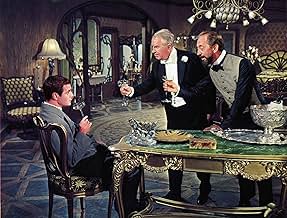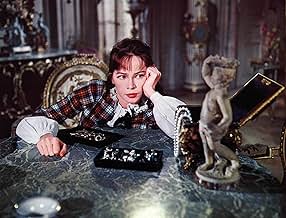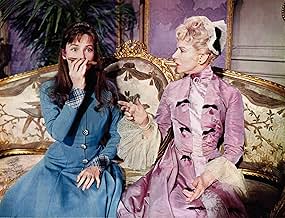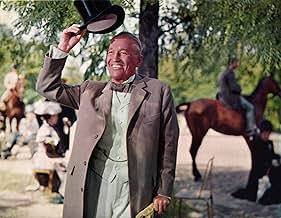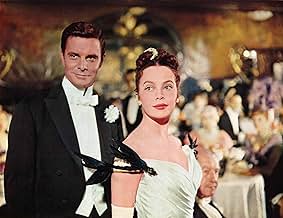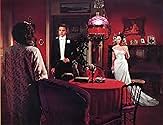AVALIAÇÃO DA IMDb
6,6/10
26 mil
SUA AVALIAÇÃO
Cansado das convenções da sociedade parisiense, um playboy e uma jovem desfrutam de uma amizade platônica, mas não por muito tempo.Cansado das convenções da sociedade parisiense, um playboy e uma jovem desfrutam de uma amizade platônica, mas não por muito tempo.Cansado das convenções da sociedade parisiense, um playboy e uma jovem desfrutam de uma amizade platônica, mas não por muito tempo.
- Direção
- Roteiristas
- Artistas
- Ganhou 9 Oscars
- 22 vitórias e 9 indicações no total
Marie-Hélène Arnaud
- Girl at Maxim's
- (não creditado)
Jack Ary
- Waiter at "Palais de Glace"
- (não creditado)
Daniel Aubé
- A boy at Jardins des Tuileries
- (não creditado)
Richard Bean
- Harlequin
- (não creditado)
Cecil Beaton
- Gentleman in Park
- (não creditado)
Jacques Bertrand
- Maitre d'Hotel Maxim's
- (não creditado)
Margaret Bristow
- Showgirl
- (não creditado)
Paul Cristo
- Restaurant Patron
- (não creditado)
Hubert de Lapparent
- Gaston's Private Secretary
- (não creditado)
Cilly Feindt
- Girl on Horseback at Pré Catelan
- (não creditado)
- Direção
- Roteiristas
- Elenco e equipe completos
- Produção, bilheteria e muito mais no IMDbPro
Avaliações em destaque
The ability to do fine musicals was one of Hollywood's endearing traits. However, in Gigi they produced a GREAT musical that is in a class by itself. The score, the libretto, the costumes, photography et al won Oscars and deserved them.
However, the cast led by Caron and Chevalier all deserved a special Oscar. They were cast perfectly and performed to perfection. Could there be a better Gigi than Caron? Her ability to go from a charming child to a beautiful women is overwhelming. The songs that Chevalier has made into classics, appear to have been written especially for him. Could one visualize any other personality performing these songs?
Jourdan is perfect in his role and so is Gingold. Thank heaven!!! Lastly, I must pay homage to that city on the Seine. It is the ultimate star and should have gotten a special award.
I agree with those readers that have called Gigi the best Hollywood musical; it is really the perfect musical. Thank heaven!!!
However, the cast led by Caron and Chevalier all deserved a special Oscar. They were cast perfectly and performed to perfection. Could there be a better Gigi than Caron? Her ability to go from a charming child to a beautiful women is overwhelming. The songs that Chevalier has made into classics, appear to have been written especially for him. Could one visualize any other personality performing these songs?
Jourdan is perfect in his role and so is Gingold. Thank heaven!!! Lastly, I must pay homage to that city on the Seine. It is the ultimate star and should have gotten a special award.
I agree with those readers that have called Gigi the best Hollywood musical; it is really the perfect musical. Thank heaven!!!
Enchanting and captivating are two words to describe this wonderful lerner-lowe collaboration. A musical in every sense of the word its happy, charming, emotional and contains some truly brilliant performances, none more so that the wonderful Mr Chevailier who steals this seem with his charming lechery. Although the singing of Miss Caron is dubbed she puts in the performance of a lifetime to be Gigi. I feel those who thought a Certain Miss Hepburn would be better in the role are badly mistaken, for she is sweet and charming, everything the immortal Gigi should be.
Herimone Gingold is wonderful as Grandma and Jourdan is terribly handsome and suave as Gaston. Even a Gabor, the more talented Eva shines in this because there simply is not a bad moment, as for Jaques Bergerac (Mr Ginger Rogers) his role may be small, but he sure is handsome.
The score is 100 percent, The parisians is my personal favourite number, the title number is beautiful, thank heavens for little girls has become a standard, she is not thinking of me is a knockout and the night they invented champagne is wonderful, my only regret? So little dancing for the greatly talented Miss Caron.
Herimone Gingold is wonderful as Grandma and Jourdan is terribly handsome and suave as Gaston. Even a Gabor, the more talented Eva shines in this because there simply is not a bad moment, as for Jaques Bergerac (Mr Ginger Rogers) his role may be small, but he sure is handsome.
The score is 100 percent, The parisians is my personal favourite number, the title number is beautiful, thank heavens for little girls has become a standard, she is not thinking of me is a knockout and the night they invented champagne is wonderful, my only regret? So little dancing for the greatly talented Miss Caron.
...how is this MY FAIR LADY? Over and over again, like a herd, everyone is writing that it's a copy, or a remake, or very similar to. This is an adaptation of a Colette novel, not a Bernard Shaw play. While both stories have a central female character, one is being groomed in elocution while the other is being groomed as a hook-- that is, as a coquette. Is your suspense of imagination so narrow that the same musical team cannot create more than one score without crucifixions for similarities? (Lerner & Lowe also wrote BRIGADOON and PAINT YOUR WAGON...are they also rip-offs of MFL?) Anyway, the film- resplendent in set pieces, cinematography, and especially costumes, is an execution in contradictions: it takes a group of less-than-respectable characters and makes them respectable. The lovely Leslie Caron shines as the title character who reveals to her already shocked family that she's not as naive as they seem to think in the ways of courtship and will not give herself to a man that she doesn't actually love. (Remarkably ahead of its time, when you think about it.) There is also something of an enigma in Maurice Chevalier, who, while being a favorite with audiences, is- let's face it- a dirty old man. After more than an hour of boasting about conquering girls young enough to be his granddaughters, he does a kind of about-face when he begins a twilight terrace scene with 'grandmama' Hermoine Gingold. As they reminisce about their own love affair in their white suits (was she the love of his life?) they contribute the film's finest moment: the duet "I Remember It Well (visually breathtaking against a sky which changes from pastel blue to coral to a flaming orange sunset)." The DVD, set to wide-screen, is the only way to enjoy something like this.
There are some movies one enjoyed years ago that now, in the light of a more progressive culture, seem disturbing. But I found Gigi inherently creepy when I first saw it as a teenager in the '70s. Admittedly some things bother me more now than then, like a middle-aged man singing about how great little girls are because when they're teenagers he'll have sex with them, but the central premise always struck me as deeply disturbing.
This is essentially a movie about a young girl pushed into sex work by her family of sex workers. She does not, at first, understand that's what's happening, but when she figures it out she's not happy about it. And I just don't see how that can be alright. It would be one thing if this were a commentary on a time when most women's only real path to power and fortune was through sex, but that's not what this is. This is a light frothy musical about something really bad.
And it's a shame, because it's full of great songs. Ignoring the sleaziness, Thank Heaven for Little Girls is charming. The Night they Invented Champaign is a fun, amusing number, as is I Remember it Well.
The performances are excellent, particularly Leslie Caron as Gigi. But I can't even watch this movie because I find it so creepy. Gigi's situation is heartbreaking, and while yes, it's a 50s musical that resolves everything pleasantly, Gigi is powerless in the equation.
As a youth I was horrified by a movie about someone my age who's agency had been taken away by "well meaning" relatives. As an adult I find it even more disturbing.
And yeah, a lot of people are just going to say I'm a buzzkill and it's just light froth. But I can't see it that way.
This is essentially a movie about a young girl pushed into sex work by her family of sex workers. She does not, at first, understand that's what's happening, but when she figures it out she's not happy about it. And I just don't see how that can be alright. It would be one thing if this were a commentary on a time when most women's only real path to power and fortune was through sex, but that's not what this is. This is a light frothy musical about something really bad.
And it's a shame, because it's full of great songs. Ignoring the sleaziness, Thank Heaven for Little Girls is charming. The Night they Invented Champaign is a fun, amusing number, as is I Remember it Well.
The performances are excellent, particularly Leslie Caron as Gigi. But I can't even watch this movie because I find it so creepy. Gigi's situation is heartbreaking, and while yes, it's a 50s musical that resolves everything pleasantly, Gigi is powerless in the equation.
As a youth I was horrified by a movie about someone my age who's agency had been taken away by "well meaning" relatives. As an adult I find it even more disturbing.
And yeah, a lot of people are just going to say I'm a buzzkill and it's just light froth. But I can't see it that way.
Having seen this film several times, I definitely have to rate Gigi as one of the most charming musicals ever made. The delightful score, by Lerner & Loewe, includes songs such as "I Remember it Well," "The Night They Invented Champagne," "Thank Heaven For Little Girls," as well as the title track, "Gigi," sung with surprising candor and earnestness by Louis Jourdan. Although reminiscent of their work on My Fair Lady, this score not only stands beautifully on its own but also grows in depth with each viewing.
The three principals, Leslie Caron, Louis Jourdan, and Maurice Chevalier, along with the Paris locales helps maintain a distinctively French flavor, especially in the way the characters relate and interact.
For everyone who has commented on the political incorrectness of the story, a closer look will actually reveal the true feminist perspective of Colette's work which was groundbreaking for its time: 1) the story is a commentary and observation of the limited social and economic options for women outside of marriage during the turn of the century Paris, 2) Although Gigi (Caron) never fully masters her lessons and grooming, she is able to capture Gaston's (Jourdan) heart precisely because of her imperfections, and 3) most importantly, it is Gaston rather than Gigi who is forced to truly transform himself and defy the social conventions of the time to bring the story to its resolution.
Compare this to My Fair Lady, which offers similar social commentary but resolves itself in a more standard way: For example 1) Eliza Dolittle only becomes noticeable and lovable after transforming her outward appearance and speech patterns 2) Although Professor Higgins finally realizes his love for Eliza at the end, it is Eliza who is forced to submit her will by effecting a reconciliation that does nothing to resolve any of the issues raised in the scenes leading up to that point.
Definitely see Gigi and judge for yourself. (By the way, the widescreen version is sooooo much better. This is especially apparent in numbers such as "I Remember It Well" where entire characters are forced to be cut out of the screen.)
The three principals, Leslie Caron, Louis Jourdan, and Maurice Chevalier, along with the Paris locales helps maintain a distinctively French flavor, especially in the way the characters relate and interact.
For everyone who has commented on the political incorrectness of the story, a closer look will actually reveal the true feminist perspective of Colette's work which was groundbreaking for its time: 1) the story is a commentary and observation of the limited social and economic options for women outside of marriage during the turn of the century Paris, 2) Although Gigi (Caron) never fully masters her lessons and grooming, she is able to capture Gaston's (Jourdan) heart precisely because of her imperfections, and 3) most importantly, it is Gaston rather than Gigi who is forced to truly transform himself and defy the social conventions of the time to bring the story to its resolution.
Compare this to My Fair Lady, which offers similar social commentary but resolves itself in a more standard way: For example 1) Eliza Dolittle only becomes noticeable and lovable after transforming her outward appearance and speech patterns 2) Although Professor Higgins finally realizes his love for Eliza at the end, it is Eliza who is forced to submit her will by effecting a reconciliation that does nothing to resolve any of the issues raised in the scenes leading up to that point.
Definitely see Gigi and judge for yourself. (By the way, the widescreen version is sooooo much better. This is especially apparent in numbers such as "I Remember It Well" where entire characters are forced to be cut out of the screen.)
Oscars Best Picture Winners, Ranked
Oscars Best Picture Winners, Ranked
See the complete list of Oscars Best Picture winners, ranked by IMDb ratings.
Você sabia?
- CuriosidadesWhen Alan Jay Lerner met Leslie Caron in London to discuss the film with her, he was surprised to discover that Caron, who was of French birth, had become so immersed in the English culture that she had lost her French accent.
- Erros de gravaçãoDuring Gaston's song by the pond thinking of Gigi, there is a fence in the pond forcing the swans to stay in close background. The swans, obviously confused yet undeterred, keep swimming into the fence attempting to get to the swan in deep background on the other side of the pond.
- Citações
Aunt Alicia: Love, my dear Gigi, is a thing of beauty like a work of art, and like a work of art it is created by artists. The greater the artist the greater the art. And what makes an artist?
Gigi: Cigars and jewelry?
Aunt Alicia: Gigi, you're from another planet.
- Versões alternativasIn some prints shown on television, we see still photos of Leslie Caron part of the time during the song "Gigi", instead of seeing Louis Jourdan singing. (This occurs after the verse and first chorus, when the orchestra plays the song while Jourdan only exclaims "Gigi!") As shown currently, we see Jourdan singing throughout the whole song, as in the theatrical release.
- ConexõesEdited into Histoire(s) du cinéma: Une histoire seule (1989)
- Trilhas sonorasThank Heaven for Little Girls
(uncredited)
Lyrics by Alan Jay Lerner
Music by Frederick Loewe
Performed by Maurice Chevalier
Principais escolhas
Faça login para avaliar e ver a lista de recomendações personalizadas
Detalhes
- Data de lançamento
- País de origem
- Idiomas
- Também conhecido como
- The Parisians
- Locações de filme
- Venice Beach, Venice, Los Angeles, Califórnia, EUA(beach scenes)
- Empresa de produção
- Consulte mais créditos da empresa na IMDbPro
Bilheteria
- Orçamento
- US$ 3.319.355 (estimativa)
- Faturamento bruto mundial
- US$ 789
- Tempo de duração
- 1 h 55 min(115 min)
- Cor
- Mixagem de som
- Proporção
- 2.35 : 1
Contribua para esta página
Sugerir uma alteração ou adicionar conteúdo ausente


